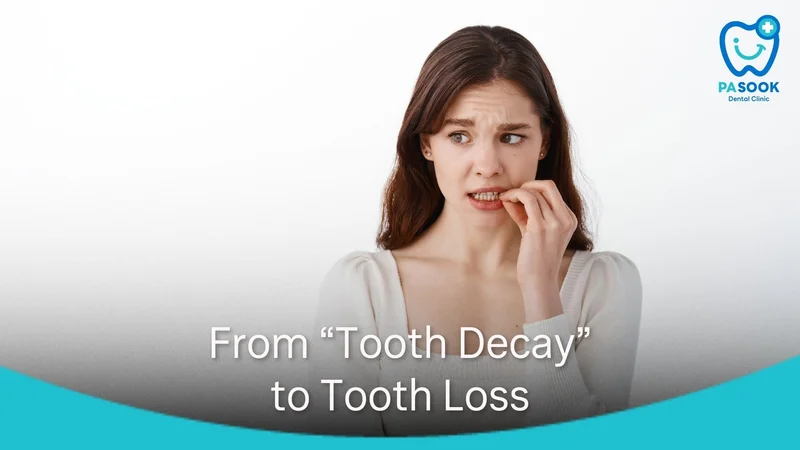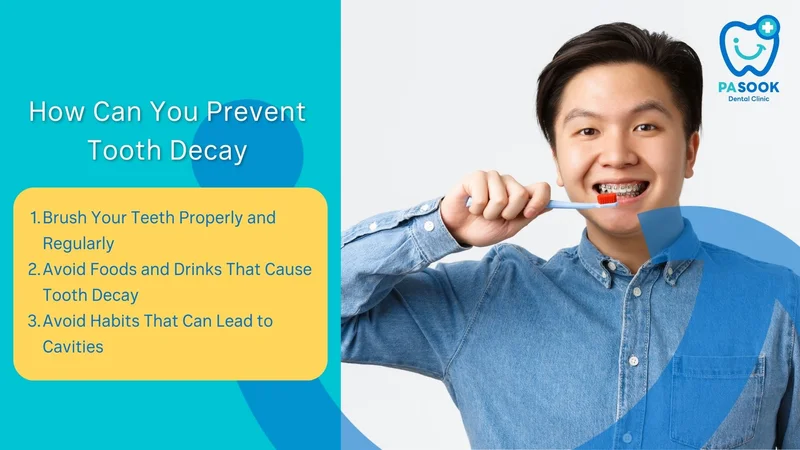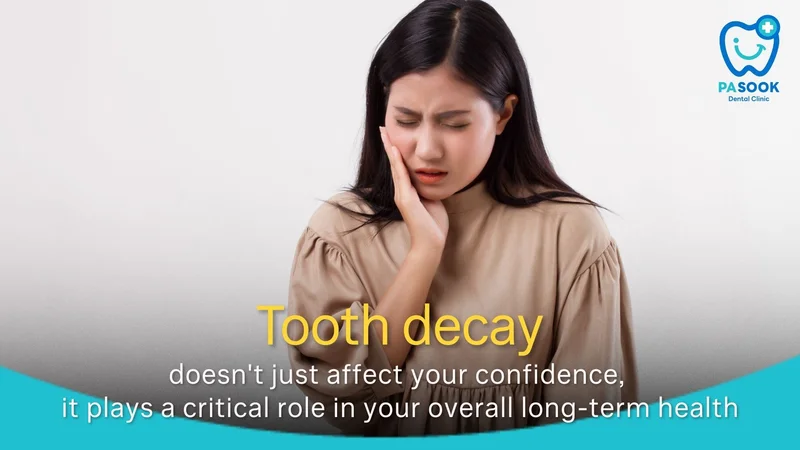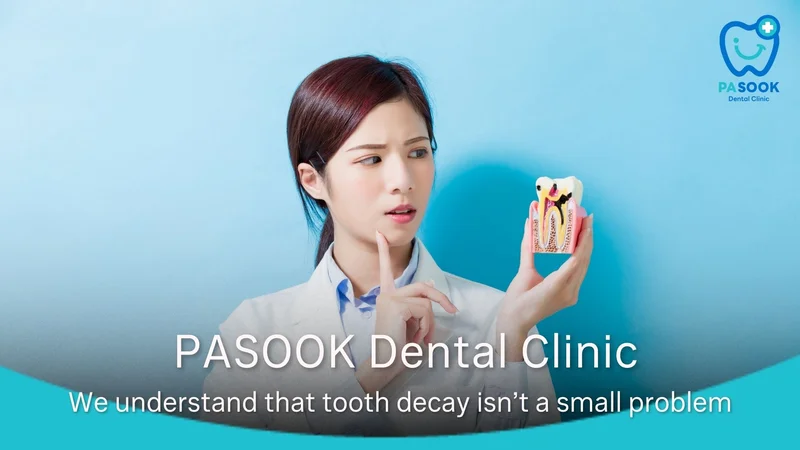From Tooth Decay to Tooth Loss: How to Prevent and Treat It Effectively

From Tooth Decay to Tooth Loss: How to Prevent and Treat It Effectively

ALT : A Problem That Can Lead to Tooth Loss
Tooth decay is a common issue that should never be underestimated as a minor cavity waiting to be filled. In reality, tooth decay is a continuous process that gradually destroys the tooth structure, spreading from the outer enamel layer to the dental pulp. If left untreated, it can result in tooth extraction or permanent tooth loss.
Most cases of permanent tooth loss begin with untreated tooth decay that progresses unnoticed or ignored. Treating tooth decay is not just about fixing damage but involves addressing habits and preventive oral care. This approach is key to maintaining strong teeth and overall health without further complications.
Table of Contents
1.What Is Tooth Decay and Why Is Everyone at Risk?
2.What Causes Tooth Decay? Risk Factors and Behaviors to Watch
3.Is Treating Tooth Decay Difficult? What Are the Available Options?
4.What Happens If Tooth Decay Is Left Untreated?
5.How Can You Prevent Tooth Decay?
What Is Tooth Decay and Why Is Everyone at Risk?
Tooth decay is the gradual destruction of tooth structure caused by acids produced by bacteria in your mouth. These acids break down the enamel (the tooths hard outer layer) and can progress deeper into the tooth, causing pain and infection. If left untreated, decay can reach the nerve inside the tooth, often resulting in severe pain and even tooth loss.
Everyone is at risk of tooth decay, regardless of age. This is due to the natural presence of bacteria in the mouth and various lifestyle factors such as frequent consumption of sugary foods and drinks or improper dental hygiene.
What Causes Tooth Decay? Risk Factors and Behaviors to Watch
Several key factors contribute to the development of tooth decay:
- Plaque Biofilm Accumulation: Dental plaque is a sticky film of bacteria that adheres to the tooth surface. These bacteria produce acids continuously, which attack the enamel.
- Frequent Intake of Sugars and Carbohydrates: Consuming sugary and processed carbohydrate-rich foods and drinks like sodas, candies, and energy drinks provides fuel for harmful bacteria to generate acids.
- Improper or Inconsistent Brushing: Inadequate oral hygiene fails to remove plaque effectively, allowing bacteria to thrive and produce enamel-eroding acids.
- Reduced Saliva Flow: Saliva plays a crucial role in neutralizing acids and promoting remineralization of the tooth enamel. Dry mouth or low saliva production increases vulnerability to decay.
- Lifestyle Habits: Smoking and excessive alcohol consumption can weaken oral immunity and damage the soft tissues inside the mouth, increasing the risk of cavities.
Is Treating Tooth Decay Difficult? What Are the Available Options?
The complexity of treating tooth decay largely depends on the stage at which the decay is detected. Early-stage tooth decay can often be managed effectively with fluoride treatments and behavioral changes, preventing further damage. However, once decay progresses into the dentin layer or reaches the pulp (nerve) of the tooth, treatment becomes more involved.
Here are the common approaches to managing tooth decay based on its severity:
- Fluoride Therapy: For initial or early decay, professional fluoride applications help to remineralize and strengthen the enamel, potentially reversing early lesions.
- Dental Fillings: When decay has progressed beyond the enamel, removing the decayed portion and restoring the tooth with composite resin or amalgam fillings is necessary.
- Root Canal Treatment: If decay reaches the pulp chamber causing infection or inflammation, a root canal procedure is required to remove the infected tissue and save the tooth.
- Tooth Extraction and Replacement: In cases where the tooth cannot be preserved, extraction followed by replacement options such as dental implants, bridges, or dentures is recommended.
What Happens If Tooth Decay Is Left Untreated?
Untreated tooth decay affects far more than just the visible cavityit leads to the progressive deterioration of your entire chewing system, with significant long-term consequences both directly and indirectly.
- In the early stage, you may experience mild toothache or sensitivity when chewing or consuming hot and cold foods and drinks.
- Once decay reaches the pulp (nerve) of the tooth, the pain becomes severe, often disrupting sleep and daily activities.
- If left untreated for a long time, infection can spread to the tooth root and jawbone, increasing the risk of abscess formation or sinus infections, especially with upper teeth.
Moreover, untreated decay can cause neighboring teeth to shift or tilt, altering your bite alignment and potentially leading to temporomandibular joint (TMJ) disorders over time.
How Can You Prevent Tooth Decay?

Although tooth decay can seem unavoidable in todays lifestyle, prevention remains the cornerstone of modern dentistry. With consistent care and proper knowledge, you can easily protect your teeth from decay in your daily routine by following these simple steps:
1. Brush Your Teeth Properly and Regularly
Use a soft-bristled toothbrush and fluoride toothpaste. Brush at least twice a day for two minutes each time. Dont forget to floss daily to remove plaque and food debris from between your teethareas where cavities often begin.
2. Avoid Foods and Drinks That Cause Tooth Decay
Avoid foods high in sugar, such as caramel, candies, and sweetened beverages. Also limit acidic items like soft drinks, sour teas, and fruit-flavored drinks, as their acidity can directly erode tooth enamel and lead to cavities.
3. Avoid Habits That Can Lead to Cavities
Dont smoke, skip brushing at night, or miss your dental check-upsthese habits let bacteria build up and increase your risk of tooth decay.
Tooth decay doesn't just affect your confidence, it plays a critical role in your overall long-term health

Oral health is the gateway to your digestive system and is closely linked to your overall health. Chronic tooth decay not only causes pain and difficulty chewing, but has also been associated with systemic conditions such as diabetes, heart disease, and chronic inflammation throughout the body.
This means that taking care of your teeth isn't just about a confident smileits a vital part of protecting your long-term well-being.
We understand that tooth decay isnt a small problem. At PASOOK Dental Clinic, were here to guide and treat you with care.

At PASOOK Dental Clinic, we know that tooth decay is more than just a common dental issue - its a health concern that should not be ignored. The good news is: it can be prevented and managed effectively when diagnosed early and treated correctly.
Our team of experienced dentists focuses on understanding your lifestyle habits, providing personalized treatment plans, and offering clear guidance every step of the way. Were here to help you protect your teeth, prevent complications, and maintain a healthy smile for life.


